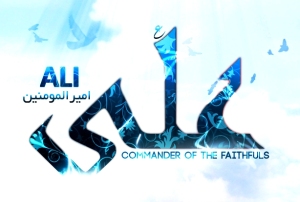
Hadrat Ali (KaramAllahu Wajhu) was distinguished not only by generosity and deep knowledge, but also by outstanding courage. He took part in all but one of the armed struggles for the survival of Islam, and became renowned as a heroic figure in every battle he entered. He missed just one campaign, the battle of Tabuk. The Prophetﷺ asked him not to come out for Tabuk, but to watch over the community and the members of the Prophet’s family at Madina. This upset Hadrat Ali (KaramAllahu Wajhu). He complained, “O Prophet! Are you leaving me behind to take care of women and children?”
The Prophetﷺ answered with these consoling words: “You are in the same position to me as Aaron was to Moses, except that there will be no prophet after me.” (1)
It was the custom of the Arabs to call their most famous warriors to step forward for single combat as a prelude to the general engagement of both sides in battle. The Prophetﷺ usually asked Hadrat Ali (KaramAllahu Wajhu) to undertake such single combats. With Allah’s will, he bested every opponent. He was, therefore, widely known by the title Victorious Lion of Allah.
The heroic performance of Hadrat Ali (KaramAllahu Wajhu) was no doubt rooted in the spiritual inspiration of the Prophet. For Muhammadﷺ once said, “The real hero is not the person who prevails over his rival in combat. The real hero is the person who controls himself in times of anger.” (2) Hadrat Ali (KaramAllahu Wajhu) was a good example of the sort of real warrior pointed out by this saying of the Prophetﷺ. He lived a life in which he triumphed over his ego all the time.
In one battle, Ali (KaramAllahu Wajhu) was about to kill a soldier from the army of the idol-worshippers. On the verge of death, that soldier spat in his face. Hadrat Ali (KaramAllahu Wajhu) stopped, put down his sword, and told the man to get up and go. The soldier was astounded. He asked Hadrat Ali (KaramAllahu Wajhu) why, when he held all the power and had been insulted, he was giving his opponent another chance. Hadrat Ali (KaramAllahu Wajhu) answered, “We fight two kinds of battles. The first is against idol-worshippers like you; the second is against our lower selves. That battle requires us to control our passions. I had been fighting against you only for the sake of Allah. When you spat in my face, it made me angry. If I had killed you in that moment, it would have been to satisfy my own rage, and my lower self would have triumphed over me. That is why I set you free. I have won the great battle, the battle with my own lower self. To be a slave in the hands of the lower self is greater danger for Muslims than the attacks of idol-worshippers.” (3)
With this answer, Hadrat Ali (KaramAllahu Wajhu) raised the veil from the heart of the enemy soldier. The man was enlightened with faith, and became a Muslim. Later this new Muslim took part in many battles at the side of Hadrat Ali (KaramAllahu Wajhu). He followed Hadrat Ali’s teaching, differentiating carefully between anger for the sake of Allah and anger for the sake of one’s own passions. He gave the battle against his lower self priority over fighting any other enemy.
Hadrat Ali (KaramAllahu Wajhu) was a heroic warrior, yet never ceased living a life of spiritual commitment and deep devotion. During one battle, he was shot through the leg with an arrow. His supporters attempted to remove it from his leg, but Ali (KaramAllahu Wajhu) couldn’t bear the operation because the pain was so severe. Finally he told them, “Let me stand in prayer. When I am in the midst of prayer, pull the arrow.”
They followed his instruction, and took out the arrow easily. When Ali (KaramAllahu Wajhu) finished his prayer, he asked them whether they had been successful! Prayer removed him from the possibility of pain. He used to pray as if he had already departed from the world.
References:
(1) Ramazanoğlu Mahmud Sami, Hz. Aliyyu’l-Murtaza, 54.
(2) Muslim, al-Birr, 107.
(3) Ramazanoğlu Mahmud Sami, Hz. Aliyyu’l-Murtaza, 117.
